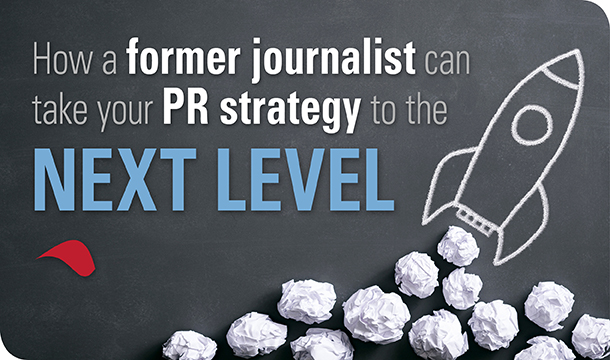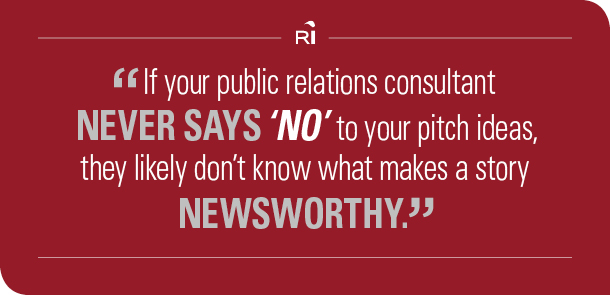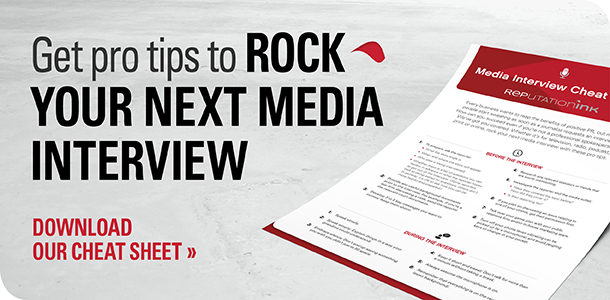How a former journalist can take your PR strategy to the next level
Let’s not sugarcoat it: Journalists and public relations professionals don’t always get along. But, both camps play an important role in the world of communications, and oftentimes one’s job can depend on the other.
If your business is looking to grow its presence and revenue through earned media and public relations, who better to help than someone who’s played for both teams?
Yep, I’m talking about working with a PR pro who used to be a journalist. Clutches pearls.
Full disclosure: I am a journalist-turned-marketer/publicist (and I’m likely not the first one you’ve met). So yes, you could call me “biased” or you could say I’m the best person to speak on the subject… or both.
Either way, if you’re in the market to boost business with PR, here’s why you should look for people like me — and the agencies who hire them.
1. Improve your content through effective writing
At the end of the day, good journos and good PR pros have one thing in common: They are storytellers. You can’t truly excel in either role if you can’t write well, and you want a good writer telling your brand’s story.
Plus, the fastest way for your news to go from potentially being covered to landing in a reporter’s trash can: typos, fluff and writing that simply doesn’t rise to their standards. They’ll move on to the next story on their already crowded plate faster than you can say “thank u, next.”

Poorly written pitch or press release? thank u, next
2. You’ll save time and get better information because they’re skilled interviewers
You don’t have time to waste explaining every basic detail of your business to a publicist. Good journalists know how to research background, dig for information, ask informed questions and interview subject-matter experts.
When it comes time to develop your PR strategy, a former journalist can take those skills and mine the gold from your leadership to ensure your best story is told. They’ll identify viable ways to pitch your company, get your experts quoted and earn you coverage. If your PR consultant isn’t doing that leg work, I say ditch ‘em.
3. They can make your stories more newsworthy
Journalists cover stories that actually matter and that their audiences care about. That may sound easy or obvious to define, but you’d be surprised what some people think is “newsworthy.”
An experienced journalist-turned-publicist understands what is actually a story and what isn’t. Your CEO may think it’s the best thing since hot yoga, but your ribbon cutting often doesn’t rise to newsworthy standards for people outside your company.
However, a former journalist may use that event as a springboard for a stronger pitch. They can identify more newsworthy angles, leverage statistics, highlight industry impact or showcase a human interest perspective to make the story more attractive to media.
Your PR consultant should also know in what media outlets a story is most likely to get covered and how to frame it to make it newsworthy in the eyes of an editor. If your public relations consultant never says “no” to your pitch ideas, they likely don’t know what makes a story newsworthy. (Click here to tweet that truth bomb.)
4. They can build better media relationships for you, which leads to better coverage
You know those days when it feels like you’ve dealt with annoying people from sunrise to sunset? Welcome to the everyday life of a journalist. A PR pro who has walked in a journalist’s shoes understands the things they deal with, and knows what gets on their nerves.
I remember once frantically writing my scripts 10 minutes before I had to report live on TV from the scene of a breaking news story, when suddenly my iPhone rang: “Hi, I’m just following up on that press release I sent last week about our 5K fundraiser…”
RIP to those precious 30 seconds before deadline.
Moral of the story: A PR pro who knows the lingo, can relate to what journalists go through and understands their pet peeves is going to be a lot more successful at building relationships on behalf of your business.
(It’s a two-way street, by the way. See: “10 things journalists do that annoy PR pros.”)

My pre-PR days in front of the camera
5. They can help you keep up with today’s fast-paced news cycle
Speaking of deadlines… journalists live and die by them. A PR person who really understands this (I’m talking empathy here, not sympathy) will have more success pitching you to the media. Not only will they know when and how to respect a reporter’s time, but they will keep your company’s PR strategies on track to ensure they don’t grow stale in today’s fast-paced news cycle.
6. They can tell your brand story across various media formats
In today’s world of multimedia news, journalists wear many hats. From video to social media, most reporters work as “one-man bands” and cover stories across a variety of channels.
If your PR professional was once a journalist, they likely have skills in photography, videography, audio and/or social media. These are tools they can leverage when pitching your brand.
Perhaps they can capture images to supplement that press release, shoot b-roll video that TV stations may want or work easily with radio producers to set up an interview because they understand the process.
Before you send me hate mail…
I’ve worked with enough lawyers to know a thing or two about disclaimers. So let me say this:
- I respect the hell out of journalists. They do important work that is foundational to democracy and critical to our everyday lives — whether that’s keeping corporations and politicians accountable, helping us get to work on time or connecting us our community. Just because I’m not a reporter anymore doesn’t change my view on that.
- A PR professional who’s not a former journalist doesn’t automatically suck, and not all journalists-turned-publicists are necessarily great PR practitioners… but they often are.
So if you’re in the market for a PR agency, consider if they have former reporters on staff — it’s always a bonus.
What qualities would you add to the list? Do you need help identifying the next steps of your PR strategy? Do you feel personally attacked by this post and just want to talk out your feelings? It’s okay, you can @ me, or just email me at steven@rep-ink.com










